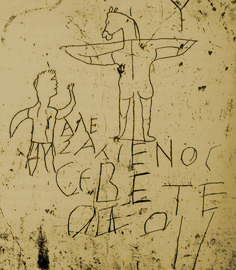The Alexamenos graffito (also known as the graffito blasfemo, or blasphemous graffito) is a piece of Roman graffiti scratched in plaster on the wall of a room near the Palatine Hill in Rome, which has now been removed and is in the Palatine Hill Museum. It may be the earliest surviving depiction of Jesus and, if so, competes with an engraved gem as the earliest known pictorial representation of the Crucifixion of Jesus. It is hard to date, but has been estimated to have been made around 200 C.E. The image seems to show a young man worshipping a crucified, donkey-headed figure. The Greek inscription approximately translates to ‘Alexamenos worships [his] god’, indicating that the graffito was apparently meant to mock a Christian named Alexamenos.
______ 卐 ______
While we were talking amiably, I heard far off the uneasy neighing of horses, but thought nothing of it. Then Oribasius mentioned those Hebrew books which the Galileans refer to as the old testament. This was a favourite subject with me. So much so that I forgot Helena was in the room. “I admire the Jews because of their devotion to a single god. I also admire them because of their self-discipline. But I deplore the way they interpret their god. He is supposed to be universal, but he is interested only in them…”
“Christ,” said my wife suddenly, “was sent by God to all of us.” There was an embarrassed silence.
“The issue,” I said finally, with great gentleness, “is just that: would the One God intervene in such a way?”
“We believe that He did.”
The room was now completely still save for the far-off sound of horses. My companions were on edge.
“Yet is it not written in the so-called gospel of John, that ‘out of Galilee arises no prophet’?”
“God is God, not a prophet,” said Helena.
“But the idea of the Nazarene’s mission, in his own words, is taken from the old testament, which is Jewish, which says that a prophet—a messiah—will one day come to the Jews, but not God himself.”
“That is a difficulty,” she admitted.
“In fact,” and I was stupidly blunt, “there is almost no connection between what the Galileans believe and what the Nazarene preached. More to the point, I see nothing in the Jewish text that would allow for such a monstrosity as the triple god. The Jews were monotheists. The Galileans are atheists.”
I had gone too far. Helena rose, bowed, and withdrew, accompanied by her ladies.
My companions were alarmed. Priscus spoke first. “What a gift you have, Caesar, for making the difficult impossible!”
The others agreed. I asked their forgiveness. “Anyway,” I said, not believing my own words, “we can trust Helena.”
“I hope so.” Sallust was gloomy.
“One must be true to what is true,” I said, wishing as I so often do that I had held my tongue.
There was a sudden shouting in the streets. We all sprang to our feet. We had hardly got to the door when an officer arrived to report that Sens was being attacked. Elsewhere I describe what happened and I shall not repeat it here.

3 replies on “Julian, 75”
An excellent artifact
Cesar have you considered studying the Analects of Confucian by any chance? In addition to focusing on ancestor veneration and family loyalty it offers other advice on a number of matters. America has been trying to undermine the Confucian values of East Asia in order to export their deranged habits to the Asians.
*Analects of Confucius I meant to say.